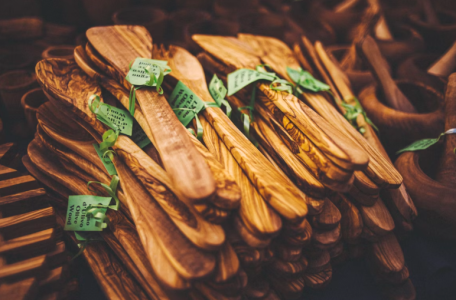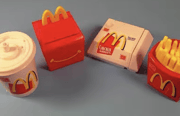Why cleaning this everyday utensil in the dishwasher is a mistake you’ll regret
- Replies 0
Kitchens are full of small routines and habits that may feel harmless in the moment but can quietly lead to long-term damage over the years.
Sometimes the very thing designed to make daily life feel simpler and more convenient ends up being the reason your most-used items wear out faster than expected.
Even the most reliable tools can crack, warp, or become breeding grounds for bacteria if they aren’t treated correctly—and while it may be tempting to toss everything into the dishwasher, there is one utensil that experts warn should never go in.
Wooden spoons, cutting boards, and even bamboo utensils can all be ruined by long soaks or a spin through the dishwasher. Heat, harsh detergents, and water exposure strip them of natural oils, leaving cracks where germs can hide.
That damage not only shortens their lifespan but also makes them unsafe for food prep. A single split can turn into a breeding ground for bacteria.

Instead, these tools need gentle treatment to last. Wash them quickly with mild soap, warm water, and a soft sponge, then air dry right away.
To lift stains, a lemon sprinkled with baking soda acts as both a brightener and gentle scrub. For deeper care, conditioning with mineral oil or beeswax-based wood wax helps keep the surface smooth and protected.
Also read: Kitchen killers? What these 10 kitchen items are doing to your health and safety!
Experts recommend monthly disinfecting, especially after cutting raw meats. A quick spritz of vinegar or a diluted hydrogen peroxide rinse does the job without harsh chemicals.
The key is to let them dry fully before use—moisture is what causes wood to swell, crack, and warp in the first place. This simple routine preserves both safety and appearance.
It’s not just wood that suffers from soaking. Cast iron cookware can lose its seasoning, pizza stones can crack, and lacquered copper loses its finish when submerged too long.
Even hand-painted dishes or glassware risk fading designs if left in water overnight. While soaking feels like a shortcut, the hidden costs add up when replacements are needed.
Also read: Is your kitchen starting to smell? Here’s what might be causing it—and how to fix it fast
Wooden tools bring warmth and tradition into kitchens, but they need extra care to stay useful for years. Think of them like investments—a little routine maintenance saves money and hassle in the long run.
So before loading the dishwasher after dinner, take a second look at what’s going inside. It could mean the difference between tools that last decades and ones you replace after just a few months.
Read next: 11 everyday kitchen items that help frugal households save big

Do you baby your wooden spoons and cutting boards, or are you guilty of tossing them in the dishwasher? Drop your kitchen confession below
Sometimes the very thing designed to make daily life feel simpler and more convenient ends up being the reason your most-used items wear out faster than expected.
Even the most reliable tools can crack, warp, or become breeding grounds for bacteria if they aren’t treated correctly—and while it may be tempting to toss everything into the dishwasher, there is one utensil that experts warn should never go in.
Wooden spoons, cutting boards, and even bamboo utensils can all be ruined by long soaks or a spin through the dishwasher. Heat, harsh detergents, and water exposure strip them of natural oils, leaving cracks where germs can hide.
That damage not only shortens their lifespan but also makes them unsafe for food prep. A single split can turn into a breeding ground for bacteria.

Why cleaning this everyday utensil in the dishwasher is a mistake you’ll regret. Image source: Egor Myznik / Unsplash
Instead, these tools need gentle treatment to last. Wash them quickly with mild soap, warm water, and a soft sponge, then air dry right away.
To lift stains, a lemon sprinkled with baking soda acts as both a brightener and gentle scrub. For deeper care, conditioning with mineral oil or beeswax-based wood wax helps keep the surface smooth and protected.
Also read: Kitchen killers? What these 10 kitchen items are doing to your health and safety!
Experts recommend monthly disinfecting, especially after cutting raw meats. A quick spritz of vinegar or a diluted hydrogen peroxide rinse does the job without harsh chemicals.
The key is to let them dry fully before use—moisture is what causes wood to swell, crack, and warp in the first place. This simple routine preserves both safety and appearance.
It’s not just wood that suffers from soaking. Cast iron cookware can lose its seasoning, pizza stones can crack, and lacquered copper loses its finish when submerged too long.
Even hand-painted dishes or glassware risk fading designs if left in water overnight. While soaking feels like a shortcut, the hidden costs add up when replacements are needed.
Also read: Is your kitchen starting to smell? Here’s what might be causing it—and how to fix it fast
Wooden tools bring warmth and tradition into kitchens, but they need extra care to stay useful for years. Think of them like investments—a little routine maintenance saves money and hassle in the long run.
So before loading the dishwasher after dinner, take a second look at what’s going inside. It could mean the difference between tools that last decades and ones you replace after just a few months.
Read next: 11 everyday kitchen items that help frugal households save big
Key Takeaways
- Wooden and bamboo utensils should never be soaked or placed in dishwashers, as they warp, crack, and harbor bacteria.
- Gentle washing with soap and warm water, followed by quick air drying, keeps them safe and functional.
- Regular disinfecting with vinegar or hydrogen peroxide helps prevent foodborne illness.
- Other items like cast iron, pizza stones, lacquered copper, and hand-painted pieces also suffer damage if left soaking.






